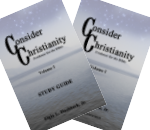|
Evidence for the Bible -
Consider Christianity Volume I
|

|
Pages:
208
ISBN: 1-893729-29-X
SKU: 189372929X
Price: $16.99
Special Price: $12.50
(Sale Ends:
2006-04-15. Special price by arrangement with publisher.
To activate, follow the link to their site, and return using their link
to us.)
Author: Hushbeck, Jr., Elgin L
Note: Are there rational
reasons to believe that the Bible is inspired and is a message from
God? Elgin Hushbeck Jr. discusses the evidence in favor of the Bible
|
|
|

|
FOR BOOK & STUDY GUIDE TOGETHER:
SKU: PKGBK008
Price: $19.99
Note: Get volume one of this
set with the study guide; great for study groups and church classes
|

|
In its first edition, Consider
Christianity by Elgin L. Hushbeck, Jr. presented a basic
defense of the Christian faith suitable for use by the thoughtful
layman or the clergyman in need of answers to key questions about the
reasons for faith.
In this new edition from Energion Publications, he has reorganized and
expanded the material, and divided it into two volumes. This volume is
the first and deals with the Bible, its inspiration and authority. The
second will deal with evidences for the existence and nature of God.
You can look at the How
to Read this Book section for more information on what this
book covers.
|
The aim of the Consider Christianity Series
is to present a systematic defense of the Christian Faith, with this
volume focusing on the evidence for the Bible. Because of this step by
step approach, different people will want to read this book in
different ways. This book was written with non-Christians in mind and
as such it tries to address a vast range of questions and objections.
Since not everyone will start this book with the same beliefs, not
everyone will want to start with Chapter 1 or even read the chapters in
order. For example, Chapter 1 deals with the text of Bible and the
Canon of Scripture (why some books were included and others left out).
If this is not an issue for you, you may want to skip this chapter. In
short, while this book is a step by step argument for the Christian
faith, you might only want to read the areas where you have questions.
Below is a brief description of each chapter
of the book. This will give you an idea of some of the questions
addressed in each chapter so you can easily find the issues that are of
interest to you.
Volume I - Evidence for the Bible
| ONE |
How Did we get the Bible? |
3 |
| What were the
origins of the Bible? Was the Bible changed by the early church
councils? Who chose the books? How do we know that the Bible has not
changed over the years in the translation process? In short, do we have
the Bible as it was written by the apostles and prophets? |
| TWO |
The Bible and Modern Criticism |
27 |
| Once it has been
established that the Bible is the same as when it was written, the
question still remains - Who wrote it? Modern Criticism has been a
truly destructive force which, under the guise of empirical research,
has undermined the faith of many. This chapter looks at Modern Critical
methods and shows that, not only are many of them unscientific, they
are biased against Christianity from the start. |
| THREE |
Archaeology and the Bible |
57 |
| Although it may be
true that the Bible has come down to us intact, this means little if
what the apostles and prophets wrote was wrong. In this chapter the
Bible is compared to the findings of archaeology and, after discussing
the problems with such comparisons, we see that there is a great deal
of support. |
| FOUR |
Science vs. Religion? |
77 |
| Perhaps nothing
has challenged faith more than the discoveries of modern science. Are
science and religion locked in mortal combat? What is the proper
relationship between them? Can they exist together or must you choose
to believe one or the other? While some conflict is inevitable, this in
no way threatens the validity of either religion or science. |
| FIVE |
Science and the Bible |
103 |
| Having shown that
science and religion need not be mortal enemies, there still remains
the question of whether or not modern science has shown the Bible to be
false. Using what was learned in chapter four, the questions of
creation and evolution are examined. The different views of the
creation account in Genesis are compared to the findings of modern
science and evolution. |
| SIX |
Is The Bible Reliable? |
131 |
| This chapter
examines the historical reliability of the Bible. How can we tell if a
document is reliable or not? After examining the methods used to judge
historical documents. These methods are applied to the Bible, including
the question of contradictions in the Bible. The result is that the
Bible can be trusted. |
| SEVEN |
The Word of God or the Speculations
of Men? |
151 |
| So the Bible we
have today is the same as that written by the apostle and prophets, it
does accurately describe events, it does not contradict itself and it
has not been disproved by modern science. This means little if it is
only the writings of men. This chapter examines prophecy in the Bible
to see that no human could have written this book alone. The Bible is
not just the speculations of men but it is the Word of God |
|
|
|

